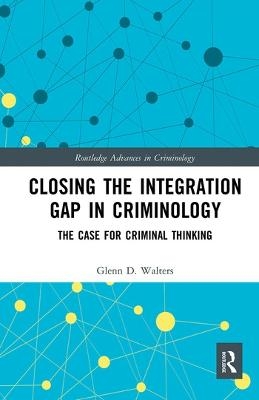
Closing the Integration Gap in Criminology
Routledge (Verlag)
978-0-367-53085-3 (ISBN)
While debate continues to rage over how to handle the burgeoning number of theories in criminology, little significant progress has been made in reducing the number of criminological theories. This book argues that theoretical integration is vital to the continued viability of criminological theory and to the growth and development of criminology as a scientific discipline. It posits that criminal thinking may be useful as a core variable in constructing a useful integrated theory for criminology, and maps out a plan for scholars to organize information for further study.
The innovative theoretical approach in this book is essential reading for students, academics, and researchers in both criminology and forensic psychology concerned with the reduction of crime via scientific inquiry.
Glenn Walters is Professor of Criminal Justice at Kutztown University in Pennsylvania. As a forensic psychologist, he worked for three decades in federal government as a clinical psychologist and drug program coordinator for military and federal prison inmates. He has published widely in criminology, including on addiction. He has developed a Psychological Inventory of Criminal Thinking Styles (PICTS). He argues that criminality is best understood and prevented by examining how it develops within the context of a person’s life and has critiqued genetic studies via meta -analytic research.
PART I: Integration in Criminology
1. An Integrated Theory of Crime: Vital Mission or Fool’s Errand?
2. A Brief History of Theoretical Integration in Criminology
3. The Latent Structure of Crime-Related Constructs
4. Risk Factors, Triads, and Elaboration
PART II: Integrating with Criminal Thinking
5. Lies, Cons, and Carnival Games: Understanding Criminal Thinking
6. The Mask of Deception: Defining Criminal Thinking
7. Nature of the Beast: Assessing Criminal Thinking
8. Criminal Thinking as a Risk Factor
9. Criminal Thinking in Triads
10. Criminal Thinking and the Elaboration Process
11. Applying Integrated Theory: Practice and Policy
12. You Are What You Think
| Erscheinungsdatum | 01.07.2021 |
|---|---|
| Reihe/Serie | Routledge Advances in Criminology |
| Zusatzinfo | 13 Tables, black and white; 22 Line drawings, black and white; 22 Illustrations, black and white |
| Verlagsort | London |
| Sprache | englisch |
| Maße | 152 x 229 mm |
| Gewicht | 317 g |
| Themenwelt | Geisteswissenschaften ► Psychologie ► Allgemeine Psychologie |
| Geisteswissenschaften ► Psychologie ► Sozialpsychologie | |
| Recht / Steuern ► EU / Internationales Recht | |
| Recht / Steuern ► Strafrecht ► Kriminologie | |
| ISBN-10 | 0-367-53085-6 / 0367530856 |
| ISBN-13 | 978-0-367-53085-3 / 9780367530853 |
| Zustand | Neuware |
| Haben Sie eine Frage zum Produkt? |
aus dem Bereich


